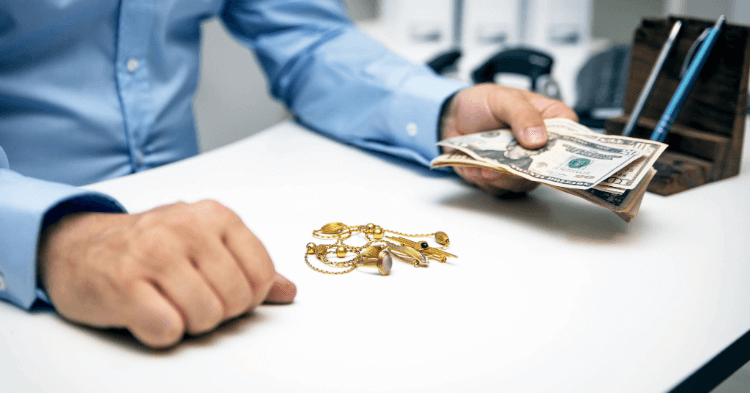If you need quick cash and are exploring loan options, you may have seen something called a pawn shop loan.
But how does a pawn shop loan work?
Pawn shops offer short-term, collateralized loans. They’re one way of getting money fast, but they can come with risks. Here’s what you need to know before considering a loan from a pawn shop.
How do pawn shops work?
Pawn shops provide short-term loans. As security for the loan, pawn shops hold on to a valuable item of yours until you repay. Once the loan is repaid, you get the pawned item back. A pawn shop loan is also referred to as a pawn loan or collateral loan.
Using a pawn shop for a small loan can be one option to consider if you have a valuable item and need a cash loan quickly. Instead of selling your item on a website such as eBay, you’re able to use the item for funds and keep it in the end.
Before you consider a pawn shop loan, it may be helpful to familiarize yourself with some common terminology:
Loan offer. To get a loan offer from a pawn shop, you’ll first need to find an item of value. This could be a musical instrument, jewelry, electronics, etc. The pawnbroker will assess the value of the item, and based on its resale value, provide you with a loan offer. The amount offered will typically be a portion of the item’s value.
Secured loan. A pawn shop loan is a type of secured loan because you are using an item of value as collateral. The shop will hold on to the item while you borrow the money and return it to you when you repay the loan.
Loan repayment. Pawn shop loans often have a short repayment period, usually around 30 days. You typically need to repay the loan in full, plus interest and fees.
Redemption. After you repay the loan, the shop will return the pawned item to you.
Default. Because the item acts as collateral for the loan, the shop has the right to sell your item if you fail to repay.
Selling items. If you don’t want to worry about repayment and you don’t want your item back, you could also simply sell the item to the pawn shop.
Interest rates. Pawn shop loans often have high interest rates, making them an expensive form of borrowing. Additionally, the shop may include other charges like storage fees or insurance.
Legal considerations. While a pawn shop isn’t a traditional financial institution like a bank or a credit union, they still provide personal loans and charge interest. This means they are subject to the same laws and regulations. Additionally, pawn shop loans are typically non-recourse — meaning the pawnbroker can not force you to repay the loan if you default.
Proof of ownership. The pawnbroker will require you to prove that you own any item you bring in. You’ll likely need to provide some sort of identification and proof that the item belongs to you.
What are the interest rates for loans from pawn shops?
The interest rates for pawn shop loans are generally high, typically ranging from 20% to 25% per month. This can lead to annual percentage rates upwards of 200%. There can also be insurance and storage fees.
In general, pawn shop loans need to be repaid in full, including interest and fees, within a month or so. The combination of high interest rates and short repayment terms can make these loans difficult for some borrowers to pay off and get out of debt. In addition, unlike unsecured loans, pawn shop loans carry the risk of a borrower losing the property they pledge as collateral. If the item possesses sentimental value in addition to monetary value, this could be an additional blow.
Although pawn shops can provide fast cash, there are other quick, easy loans available. Some of these may have lower interest rates, and some — like installment loans — spread repayment over time to reduce the cost of individual payments.
How much money can you get from a pawn shop loan?
The amount of money you can get from a pawn shop loan is based on the item’s resale value, also called an open market valuation (OMV). This amount is typically much lower than the item’s inherent value, so your loan will only be a percentage of the item’s worth.
The loan amount you receive can be as little as 25% of the item’s original value. For reference, the average pawn shop loan in the U.S. is $150, according to the National Pawnbrokers Association (NPA).
How do pawn shops work in different states?
State law differs when it comes to how pawn shops and pawn loans are regulated. The National Pawnbrokers Association (NPA) website includes a resource that breaks down pawn shop laws by state.
Pawn shops are regulated federally as well. The federal laws U.S. pawn shops operate under include The Patriot Act, Equal Credit Opportunity Act, and the Truth in Lending Act. In addition, pawn shops work with local law enforcement to prevent stolen items from being pawned.
However, some states have lax interest regulations, and there have been instances of pawnbrokers taking advantage of these loopholes.
Do pawn shop loans require a credit check?
No, pawn shop loans generally do not require a credit check. Pawn shops do not need to know your credit history because they already have loan security in the form of your item. If you can’t repay your loan, they will simply take possession of the item.
Pawn shops generally will not report you to credit bureaus, and pawn loans do not affect your credit score. This can make pawn loans attractive to those with low credit scores. However, it’s important to note that borrowers with low credit are not limited to pawn loans. There are other ways to get loans with no credit check.
What else do pawn shops do?
Beyond offering loans, pawn shops are also a place to buy and sell things.
Selling. If you need quick cash and you don’t care if you get your item back, you can also just sell it directly to the pawn shop. Keep in mind that you’ll likely only get a portion of the value since the shop has to make a profit. Finding a buyer yourself can take more time but could earn you more cash.
Buying. Pawn shops are also great places to look for deals. You can often find things like gaming consoles, watches, laptops, designer bags and musical instruments up for sale.
Is it better to pawn or sell?
If you need quick cash, but want to get your item back later then pawning is the better option. However, keep in mind that if you don’t pay the loan back, you’ll still lose your item. On the other hand, if you’re ready to let the item go, selling it may help you negotiate a higher amount since repayment won’t be needed.
How do pawn shops pay out?
Pay shops typically pay cash — whether they’re purchasing the item or lending the money. In some instances, like in the case of a larger transaction, they may offer alternatives like checks or electronic transfers.
Alternatives to pawn shop loans
When you need quick cash, there are other types of loans available that may be a better fit. Pawn shop loans are often an expensive way to borrow and you risk losing an important item. Before deciding to borrow you should carefully consider your personal finances and if it’s the right choice for you.
Borrow from friends or family. If you’re in need of funds, it can be a good idea to look to your support system first. They will often offer you the best terms and may not charge you interest. Be sure to carefully outline how and when you will pay them back to avoid putting strain on the relationship.
Personal installment loan. Installment loans offer borrowers an upfront lump sum of cash that they can repay over time. They can offer more funds than a pawn shop loan and can be easier to repay since you can spread the payments out. They can still be an expensive way to borrow, especially if you have bad credit, but interest rates will vary by lender.
Line of credit. With a line of credit, you’ll be given a credit limit that you can borrow from. As you repay the funds, the money becomes available to borrow again. It can act as a safety net, allowing you to access funds when you need them. Be sure to do your research and review all the terms before applying.
Credit card. A credit card or credit card cash advance can be an alternative to a pawn shop loan. However, if your card issuer reports to the credit bureau you could potentially damage your credit score if your credit utilization rate goes up. Additionally, you’ll accrue interest and a cash advance may have a higher rate or additional fees.
Title loan. A title loan is another type of secured loan. Instead of using an item of value to secure the loan you’ll use the title to your car. These types of loans have similar risks to pawn shop loans — high interest rates and short repayment periods can make them difficult to repay. Plus, if you fail to repay you run the risk of losing your vehicle.
Selling online. If you don’t need the money right away, you can also try to sell the item you’re pawning online. By selling directly to a buyer you may be able to get more money. There are a ton of resale sites online including eBay and Facebook Marketplace. Always prioritize your safety when meeting a buyer in person to hand over an item.
Final Thoughts
While pawn shop loans can provide quick cash in emergency situations, they also come with some risks. Before you decide to borrow from a pawn shop, be sure to consider all of your options. Additionally, it can be helpful to do some research about the loan terms and fees to be sure you fully understand and can make the right decision for you.
DISCLAIMER: This content is for informational purposes only and should not be considered financial, investment, tax or legal advice.




